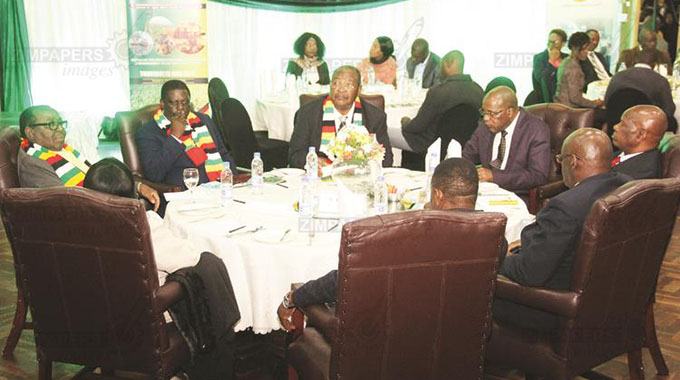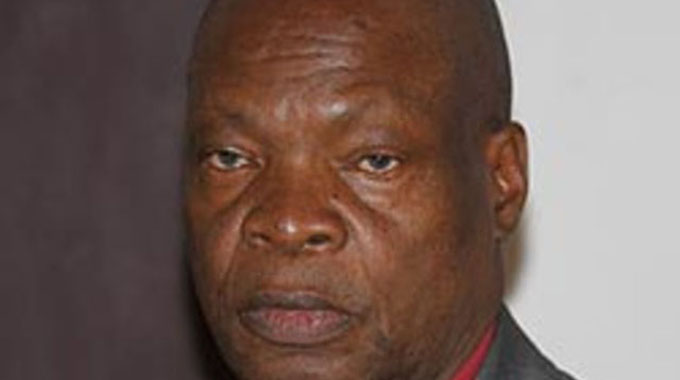Zanu-PF woos business sector

Africa Moyo and Charmaine Brown
Zanu-PF has become a professional institution under President Mnangagwa which is determined to engage all players in the business sector to transform the economy and attain the envisaged upper middle income economy status by 2030. This was said by Zanu-PF Secretary for Administration Dr Obert Mpofu in his welcome remarks during yesterday’s breakfast meeting designed to solicit views from various stakeholders ahead of the review of the Indigenisation and Economic Empowerment Policy.
The breakfast meeting was organised by ZANU-PF’s Department of Indigenisation and Economic Empowerment led by Dr Mike Bimha.
Dr Mpofu said Zanu-PF was now a “totally changed institution” and has become “better than some institutions in terms of organisation”.
“Before we moved to Zanu-PF (on a full-time basis), each time we invited colleagues to visit us there, they asked a few questions; are there still war veterans out there . . ?
“All sorts of questions would be raised, but like I am saying, the operations of Zanu-PF have been professionalised. We are now receiving embassies, NGOs, sister parties and other organisations like diplomats because of the new look set-up that we have introduced,” he said.
Dr Mpofu said full-time heads of department in Zanu-PF “take seriously” President Mnangagwa’s Vision 2030, hence the decision to engage captains of industry and get their views on the indigenisation policy review.
“We fully subscribe to the mantra that ‘Zimbabwe is Open for Business’. However, for that to happen, we must accommodate all the players in the economy; that means consulting widely from the private sector, the very big corporates, medium, small and even start-up companies.
“The Department of Indigenisation and Economic Empowerment is in the process of reviewing the indigenisation framework. For this process to happen effectively, the department intends to have consultations with different and various stakeholders like yourselves.
“This is the first of many interactions and meetings that will take place before the policy comes in place. Most of you comrades who are in attendance today (yesterday) are policymakers, entrepreneurs, captains of industry, CEOs, think-tanks and individuals in the private sector, who want to contribute meaningfully to policy that has a positive effect on growing our economy,” said Dr Mpofu.
Business member organisations such as the Confederation of Zimbabwe Industries (CZI), the Zimbabwe National Chamber of Commerce of Commerce (ZNCC), Chamber of Mines of Zimbabwe, parastatal representatives and individuals, attended the breakfast meeting and proffered their suggestions.
ZNCC vice president (Mashonaland) Mr Archie Dongo said; “If we are to revise our approach to indigenisation and economic empowerment, we are looking for benefits like creation of jobs, we are looking for poverty reduction, we are looking for employment equity, human capital attraction and retention and development as well, we are looking for employment creation and we are looking for a sense of belonging, we are looking at people who believe that they have a stake in the country they were born.
“We are also looking at encouraging entrepreneurship . . . to enhance production”.
CZI immediate past president Mr Sifelani Jabangwe said they “fully support (indigenisation) because it is in all countries where we have populations that were disadvantaged and are still disadvantaged . . .”
Chamber of Mines CEO Mr Isaac Kwesu said the mining industry “is very supportive of the Government’s desire for increased participation of indigenous Zimbabweans in the mining value chain”.
He added that the mining sector, which has grown from a US$900 million to a US$3 billion sector in the last 10 years, has a major role to play to achieve an upper middle income economy by 2030. Dr Bimha told The Herald after the meeting that a lot of ideas had been put forward and they now need to “follow-up on those specific stakeholders”.
“For example, the presenter who was talking about mining issues: it’s a lot that they have already done and I think we need to tap from some of them and look at them from a national perspective.
“So we need to engage them and probably go to them sector by sector because at the end of day, if we want to have a policy that cuts across the entire nation, we need to listen to them in terms of what have they already done, their successes, their failures, the impediments to success and what can be emulated elsewhere,” he said.
The breakfast meeting ran under the theme; “Aligning the Indigenisation and Economic Empowerment Policy with Vision 2030”.
Several Zanu-PF members including Director for Administration Dickson Dzora, Secretary for Finance Cde Patrick Chinamasa, Secretary for Economic Affairs Dr Chris Mushowe, Secretary for Information and Publicity Cde Simon Khaya Moyo, National Deputy Commissar Cde Omega Hungwe, Secretary for War Veterans Affairs Cde Douglas Mahiya, Youth League Deputy Secretary Cde Lewis Matutu, Cde Munyaradzi Paul Mangwana and former Senate President Edna Madzongwe.








Comments